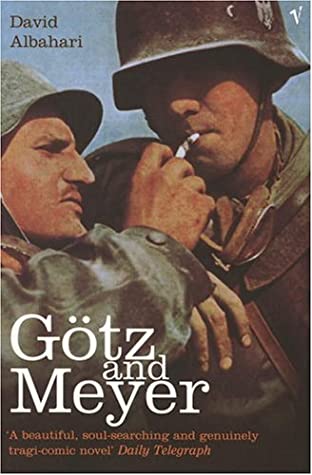“Having never seen them, I can only imagine them” is how David Albahari’s narrator opens on the subject of Götz and Meyer, two non-commissioned officers, in this 1998 (tr. Ellen Elias-Bursać, 2004) novel about the Holocaust in German-occupied Serbia. With men already liquidated, the soldiers’ role was to drive a specially rigged truck that gassed its cargo – around five thousand Jews; the women, children, and the elderly – as it transported them to prepared mass graves, around a hundred per journey.
The narrator – a literature teacher – is tracing his family tree and has come to a point, in 1942, where many of his relatives disappeared when he was still a child. Given the time and place, they will have perished in these gas trucks, driven by the eponymous Götz and Meyer, of which history records nothing more. The research switches from the family tree to become an investigation into these unknowable men, an attempt to “construct Götz and Meyer out of airy memories, unreliable recollection and crumbling archival documents”.
How old were Götz and Meyer? One more question I can’t answer. When one of my students is unable to answer a question, for example on the structure of a wreath of sonnets, I do not hesitate to enter, first in my notebook and then in the register, a bad grade. If I were to apply the same criteria to myself, I would have been held back long ago.
Without answers, we are instead provided with an imaginative outpouring as potential lives are reconstructed. Their blank, unknowable faces, neither of them truly identifiable from the other – “Götz, or Meyer” or “Meyer, or maybe Götz” – give rise to questions as to their lifestyles, their dreams, how they viewed their work, and what became of them. Here history is unreliable. It can tell us their names, but reveal nothing of them or what truly happened.
All this is presented in a Bernhardian wall of words; a single paragraph ebbing and flowing with questions that blurs fact and fiction, its narrative exhausting dead ends and always circling back to advance in new directions. The failure to pin these characters down is increasingly maddening, as the narrator, beginning to experience psychosis, conducts conversations with the drivers, further muddling the lines between reality and imagination.
Götz, or Meyer (really I), thought about what Meyer, or Götz (really I), meant to ask. This Götz who was not really Götz spoke to this Meyer who was not really Meyer. My hands tremble a little when I think of it all. Nothing easier than to stray into the wasteland of someone else’s consciousness. It is more difficult to be master of one’s own fate; simpler to be master of someone else’s.
In one darkly comic moment, as Jews are being rounded up for camp, a young girl told that she can’t bring along her pet declares it “inhuman”. But it’s very much humans responsible, and that’s where Albahari goes here, taking a pair of names from historical record, names to which horrific acts are attributed, and tries to show them as human, to demonstrate that humans, no matter which cog they are in the machine, are responsible, and that sometimes there are scant answers to inconceivable crimes but that they can be learning experiences.
Some things can never be grasped, and perhaps it is better that they stay that way, meaningless being their only meaning. A group of men, for instance, take seats around a table and decide to wipe out an entire people. There are some doubts here, although they are purely technical in nature, questions need to be answered beginning with the words when, how, and where, but no one questions the initial assumption any more. With its meaninglessness it forges new meaning, crystal clear, and thereafter that is held up as measure of all other meaning.
When the narrator takes his students on a field trip to the site of the truck loadings, it’s his way of urging the future to ensure the past never happens again by remembering what happened before. The age is upon us where witnesses’ memory is fast vanishing with them and responsibility is passing to later generations to carry the stories. By doing so we can shed light on history, something that’s unachievable when records are patchy and the branches of a family tree have no new shoots.
Aside from memory, of course, as I explained to my students: a soul that remembers cannot be lost. I know that I have already said that and I’m repeating myself , but it is not my fault that life is built on repetitions and that its movement, which resembles a straight line, actually goes round in circles. We are like a dog chasing its tail but never catching it.
This paradox of life, cyclical and straight, is well reflected in Götz and Meyer, its varied refrains rounding on themselves while driving the narrative forward. It’s a tour de force with Albahari deftly stitching reality, documented facts, and imagination into a cohesive whole; a thrilling journey into an obsessive mind that attempts to make men of monsters and displays the futility of trying to comprehend the impossible. And that knows keeping the past alight makes the future a less dark place.
